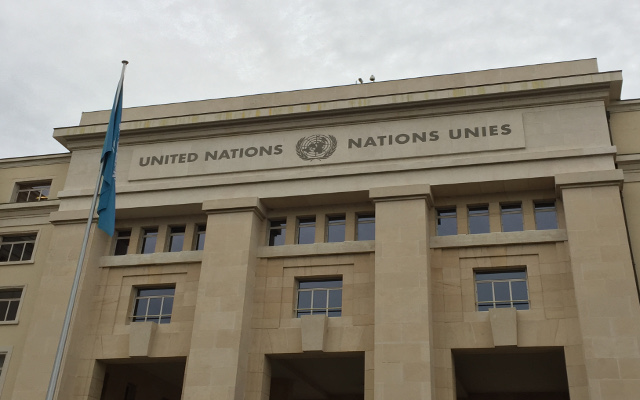From 13 June to 1 July 2016, Americans for Democracy & Human Rights in Bahrain (ADHRB) took part in the 32nd Session of the United Nations (UN) Human Rights Council (HRC) in Geneva, Switzerland to raise awareness of human rights abuses in Bahrain, Saudi Arabia, and other Gulf Cooperation Council (GCC) countries. During the Session, ADHRB met with dozens of UN Member States, NGOs, UN officials, and members of the UN Special Procedures. Additionally, ADHRB hosted two side events and delivered a series of oral interventions before the plenary meetings of the Council.
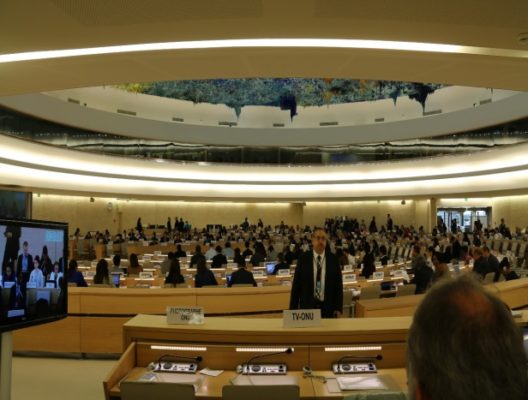
Prior to the opening of the HRC, on 27 May, the Special Procedures of the United Nations Human Rights Council released the 14th iteration of their joint communications report documenting allegations of human rights abuses from around the world. In the most recent edition of the report, the Special Procedures singled out Bahrain and Saudi Arabia as among the worst offenders of human rights in the world, citing Bahraini violations in three different cases involving a total of 12 individuals and one systematic complaint, while Saudi Arabia was the subject of three communications regarding four individuals.
In an alarming clampdown on free speech, Bahraini authorities stopped six human rights defenders at the Bahrain International Airport on 12 June ahead of their trip to Geneva to participate in the HRC. These travel bans constituted acts of reprisals against Bahraini civil society for attempting to engage with the Council. In their attempt to stifle civil society, the Government of issued travel bans to Hussain Radhi, Ebtisam Al-Saegh, Ebrahim Al-Demistani and the parents of Ali Mushaima. ADHRB, Bahrain Center for Human Rights (BCHR), Bahrain Institute for Rights & Democracy (BIRD), European Centre for Democracy & Human Rights (ECDHR), and Justice Human Rights Organization (JHRO) issued a formal complaint to the HRC Presidency and Secretariat, and called upon the international community to hold Bahrain responsible for the violation of free expression and speech.
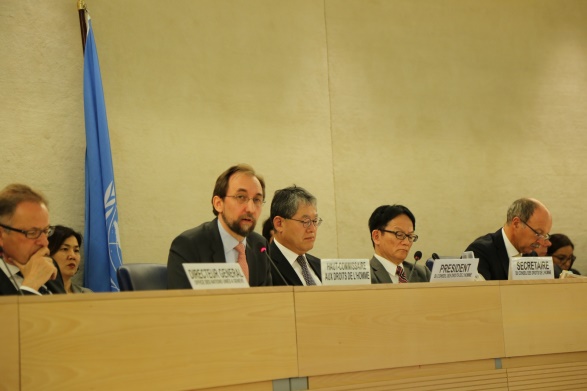
On the opening day of HRC on 13 June, the United Nations High Commissioner for Human Rights Zeid bin Ra’ad Al-Hussein raised specific concerns about Bahrain and criticized the government for repressing civil society and revoking citizenship of activists. He said, “At least 250 people in Bahrain have reportedly been stripped of their citizenship by the Government because of their alleged disloyalty to the interests of the Kingdom.” ADHRB emphatically agreed with his assessment that “repression will not eliminate people’s grievances; it will increase them.”
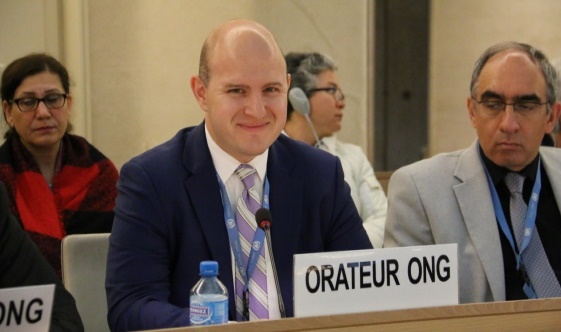
On 14 June, ADHRB delivered three oral interventions before the Council in conjunction with BIRD to draw attention to reprisals, the kafala system, and citizenship revocation in Bahrain. In the first intervention, ADHRB International Advocacy Officer, Michael Payne expressed deep regret at acts of reprisals committed by states attempting to restrict civil society’s access to this Council. Specifically, ADHRB called attention to Bahrain, where authorities implemented travel bans against the six individuals traveling to take part in the first week of HRC 32.
Later on 14 June, ADHRB delivered a second oral intervention to urge all GCC states to abolish the repressive kafala system of sponsorship-based employment, which legally ties migrants’ immigration statuses to their employers. Every year, millions of migrant workers travel to GCC countries. Once there, employers subject migrant workers to excessive work hours, unsanitary living conditions, physical abuse, and deception regarding employment terms. Saudi Arabia and Qatar also mandate that workers secure permission from their sponsor to leave the country, despite the fact that workers’ passports are often seized and confiscated upon their arrival.
To close out the day, BIRD’s Director of Advocacy, Sayed Ahmed Alwadaei, delivered an oral intervention on behalf of ADRHB which announced the government’s closure of al-Wefaq political society to the Council, and condemned Bahraini authorities for revoking the citizenship of prominent human rights activists, academics, and religious clerics. In February 2015, the government released a list of 72 persons whose citizenship it had revoked. Most on the list were human rights defenders, political activists, journalists, academics and religious scholars; while only 20 others were connected to extremist activities. BIRD and ADHRB noted that by revoking the citizenships of peaceful figures alongside violent extremists, the Bahraini government is equating human rights defenders with violent terrorists.
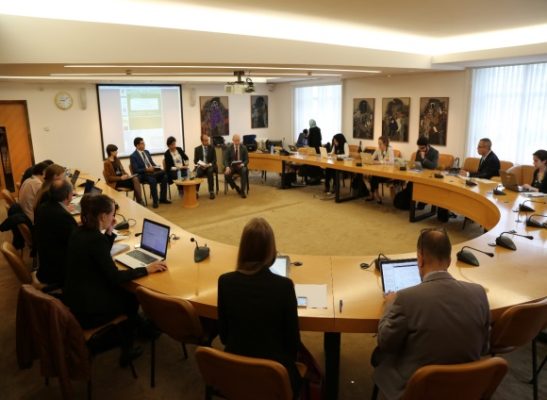
Outside the Council chambers, ADHRB, in conjunction with BIRD, CIVICUS, ECDHR, the Committee to Protect Journalists (CPJ), the International Federation for Human Rights (FIDH), and the Cairo Institute for Human Rights Studies (CIHRS), held a side-event titled “Comparing Technical Cooperation Programmes in Bahrain.” The event included a panel moderated by Jeremie Smith, Director of the Geneva Office for the Cairo Institute. Panelists included Amanda Milani, UN Liaison at ADHRB, Sayed Ahmed Alwadaei, Director of Advocacy at BIRD, Sara Katrine Brandt, Policy and Research Officer at CIVICUS, and Nicholas McGeehan, the Bahrain, Qatar, and United Arab Emirates Researcher at Human Rights Watch. The panelists gathered to discuss failed attempts at technical cooperation for human rights in Bahrain, and released ADHRB’s new report, “Charting the Seas of Abuse: Analysis of United Nations Special Procedure Communications to the Kingdom of Bahrain 2011 – 2016.” This report compiled and analyzed all UN Special Procedures’ communications with Bahrain since 2011.
On 15 June ECDHR participated in the Interactive Dialogue with the Special Rapporteur on the Right to Health, to deliver an intervention calling attention to sickle cell patients in Bahrain. ECDHR, together with Defenders for Medical Impartiality, conveyed that Bahraini hospitals have had inadequate supplies of morphine for the last month, causing sickle cell anemia patients to needlessly suffer debilitating pain. Overall, more than 18,000 Bahraini suffer from the disease. The government’s failure to provide them with the proper medicine violates the patients’ right to health and may constitute a breach of the prohibition on cruel, inhuman, and degrading treatment. Nine sickle cell patients have died so far this year in Bahrain.
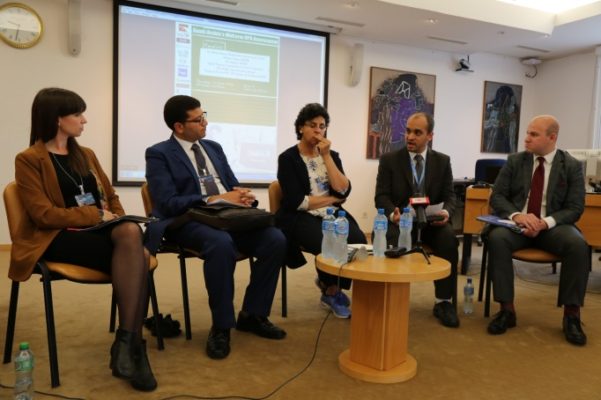
On 16 June, ADHRB, held a side event to mark Saudi Arabia’s mid-term Universal Periodic Review (UPR). The event was supported by BIRD, ECDHR, the European Saudi Organization for Human Right (ESOHR), Amnesty International, CPJ, FIDH, CIVICUS, CIHRS, the Gulf Center for Human Rights (GCHR), the International Publishers Association (IPA) and Reporters without Borders (RSF). The panel was moderated by Dr. Elham Manea from the University of Zurich and focused on Saudi Arabia’s mid-term Universal Periodic Review (UPR) assessment. Panelists included ADHRB’s Michael Payne, ESOHR’s Ali al-Dubaisy, CPJ’s Sherif Mansour, and Amnesty International’s Ella Knight. Mr. Payne, while introducing ADHRB’s new report “A Midterm Report on Saudi Arabia’s UPR Second Cycle: Analyzing Saudi Arabia’s Refusal to Reform,” also asserted that Saudi Arabia has used its increasing influence in the UN HRC to cover up human rights abuses in the kingdom, silencing other states from criticizing them. Other panelists commented on Saudi Arabia’s surface reforms, having only superficially accepted 187 of 225 total UPR recommendations, new and vague counter-terror laws, arbitrary detention, and torture. Ali al-Dubaisy from the European Saudi Organization for Human Rights (ESOHR) spoke about his own experiences as a victim of torture in 2011. Ali al-Dubaisy argued that the HRC needed to establishment a mechanism for urgent action, such as deterring imminent executions in Saudi Arabia.
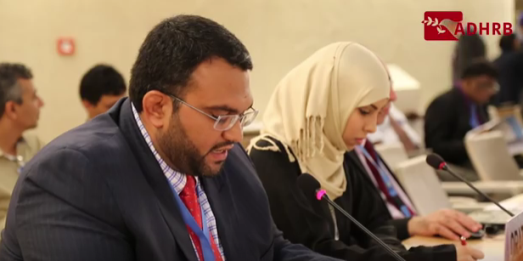
On 17 June, ADHRB UN Liaison Amanda Milani delivered an oral intervention to denounce abuses in Bahrain’s judicial system. In conjunction with BIRD, ADHRB raised concerns of government interference in the judicial system and the use of torture to coerce false confessions which have led to the conviction of thousands of prisoners. Over the years, these abuses have culminated in strikes and riots in prisons. At the close of the first week of the Session, Michael Payne delivered an oral intervention on 17 June rebuking Bahrain authorities’ continued harassment of prominent human rights activist Nabeel Rajab. Bahraini forces initially arrested Nabeel in October 2014, less than 24 hours after Nabeel returned to Bahrain after participating in the 27th Session of the Human Rights Council. However on 13 June, security forces surrounded Nabeel’s home and arrested him on charges of “spreading false news that undermines the prestige of the State”. ADHRB, in tandem with Alsalam Foundation and BIRD, called upon the HRC to work to secure the release of Nabeel and other peaceful human rights activists detained in Bahrain.
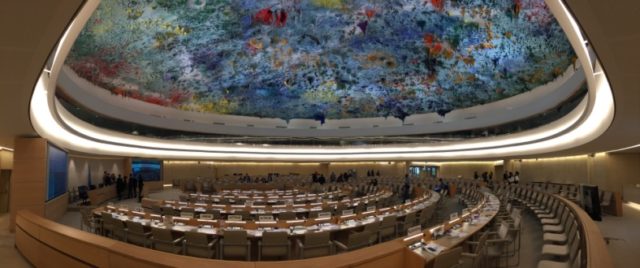
On 20 June, ADHRB issued two oral interventions: the first concerning violence against domestic workers in the GCC, and the second regarding criminalization of free expression in Bahrain. ADHRB and BIRD called the Council’s attention to the continued violence faced by female domestic migrant workers in the Gulf. As domestic workers receive extremely limited protection under the labor laws of Qatar, United Arab Emirates, Bahrain, Kuwait and Saudi Arabia, they are vulnerable to violence and even sexual exploitation. Next, Yusuf Al-Hoori delivered an oral intervention on behalf of ADHRB to raise concerns of Bahrain’s targeting of human rights defenders. Mr. Al-Hoori reiterated ADHRB’s demand that Bahrain release Nabeel Rajab and all others detained in relation to free expression.
On 22 June, ADHRB Executive Director Husain Abdulla called for the Council to convene a special session on Bahrain amidst the rapidly deteriorating situation in the country. Mr. Abdulla’s intervention remarked that a Bahraini appeals court increased the sentence against Sheikh Ali al-Salman, the Secretary General of the largest opposition party in Bahrain, al-Wefaq. Then, the Minister of Justice ordered al-Wefaq suspended, its activities ceased, their accounts frozen, and their headquarters shuttered. All of these steps culminated in the government’s move Monday to denaturalize Sheikh Isa Qassim, the preeminent spiritual leader of Bahrain’s majority Shia community, and reportedly ordered his deportation within 72 hours.
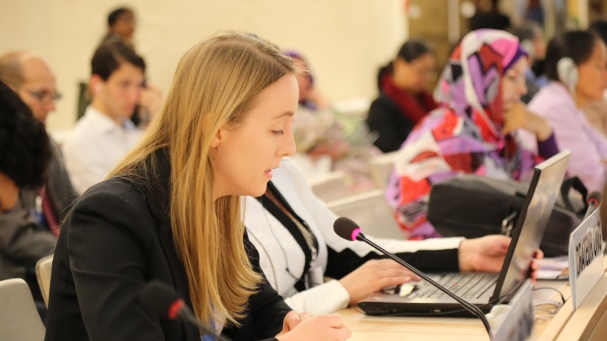
Later, ADHRB’s Amanda Milani addressed the deteriorating human rights situation in the United Arab Emirates before the HRC. Ms. Milani raised issues ranging from forced disappearance, arbitrary detention, the use of torture to coerce confessions, and the oppressive kafala system. ADHRB called upon the UAE, as a Member of the Human Rights Council, to take seriously the recommendations of the Special Procedures and commit to expedient human rights reforms.
On 24 June, the end of the second week, ADHRB issued two additional oral interventions before the Council. Yusuf Al-Hoori, on behalf of Americans for Democracy & Human Rights in Bahrain, delivered his intervention on Bahrain’s failure to cooperate with the Special Procedures; Bahrain has failed to allow any Procedures a country visit since 2006, and has twice cancelled a visit by the Special Rapporteur on Torture, Juan Mendez. Meanwhile, ADHRB International Advocacy Officer Michael Payne urged the HRC to consider stronger criteria for membership, as well as holding all current and future members states to a higher standard of human rights practice.
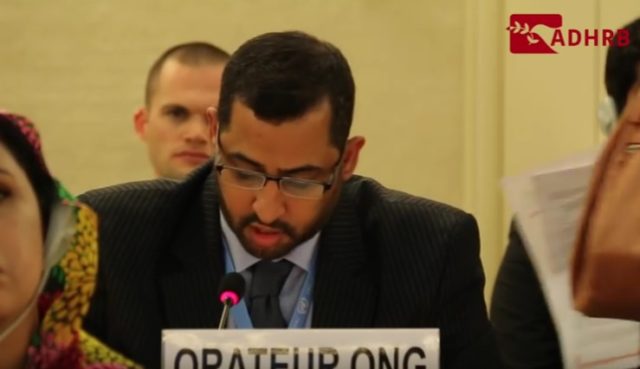
To start the third and final week of the HRC, ADHRB delivered three interventions on 27 June. Yusuf al-Hoori raised ADHRB’s concern regarding the recent repressive measures taken by Bahraini government, in conflict with its commitments to the UPR recommendations. During the second UPR cycle, the kingdom has sought to institutionalize the restrictions on the right to freedom of expression, assembly, association, and religious and cultural freedoms. All forms of opposition and protest are now illegal.
Ranya Alammar called the Council’s attention to Saudi Arabia’s failed commitments to its UPR recommendations noting that the exclusion and suppression of civil society does not support the government’s claims of application of the recommendations. The increased use of the death penalty including the execution of Sheikh Nimr al-Nimr and imprisonment of activists such as Dr. Mohammed al-Qahtani all serve as evidence that Saudi Arabia does not take seriously its commitments to implement its UPR recommendations. Lastly, Ms. Alammar delivered a further oral intervention under item eight calling attention to Saudi Arabia’s human rights violations in Yemen, specifically noting the policy of impunity for members of the security forces, the ruling families, or the wealthy.
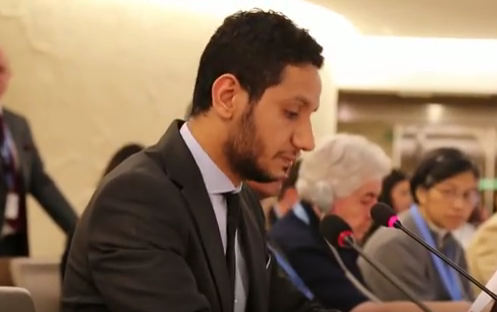
Amanda Milani delivered an oral intervention on the possibility of using sport and the Olympic ideal to promote rights for all as part of ADHRB’s engagement in a high level panel discussion. Specifically in Qatar, while they have promised to make significant reforms, over 1200 migrant workers have died so far during the construction of 2022 FIFA World Cup Stadiums. Similarly, in Bahrain, the hosting of the Formula One Grand Prix in Sakhir produced an adverse human rights impact on the ground. ADHRB asked the council to consider how sport and international competitions could alleviate, rather than exacerbate, human rights and freedom for all.
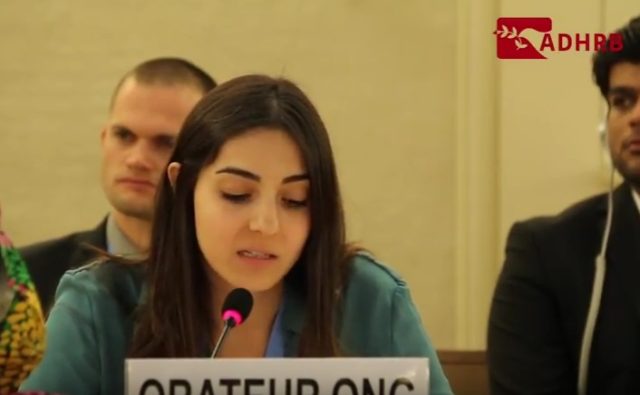
On 30 June, ECDHR Advocacy Associate Diam Abou Diab on behalf of ADHRB, delivered on oral intervention raising the Council’s attention to acts of reprisal by the Government of Bahrain. Just prior to the beginning of the 32nd session of the HRC, Bahraini border security informed two civil society activists that the government had imposed travel bans against them and they are unable to leave the country. Ms. Abou Diab noted that these two activists were among ten human rights activists subjected to travel bans when attempting to travel to Geneva for participation in the HRC. ADHRB called on OHCHR to suspend all technical cooperating with the Bahraini government until activist full protection can be guaranteed.
A number of states also mentioned Bahrain and Saudi Arabia during the Council sessions. The United States “remained concerned regarding limitation on peaceful assembly, expression, and political activism” in Bahrain. The US also stated that recent actions by the Government of Bahrain including the increasing sentence of Sheikh Ali Salman, the arrest of Nabeel Rajab, the shutdown of al-Wefaq, and the citizenship revocation of Sheikh Isa Qassim all undermine steps towards political reconciliation. During the general debate with the high level pane l on the 10th anniversary of the HRC, Laila Matar of Human Rights Watch, noted that Nabeel Rajab previously sat in the HRC but was arrested that day in Bahrain.
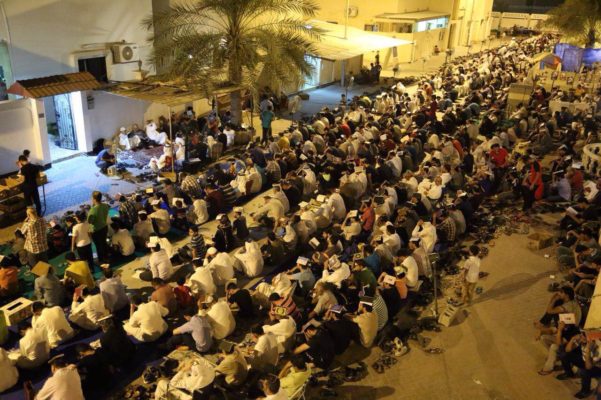
While ADHRB and partner organizations petitioned the Human Rights Council to address human rights abuses in Bahrain and GCC states, the Government of Bahrain intensified repression and violence at home. Prior to the start of the council session, the Government forced human rights activist Zainab al-Khawaja into exile. It also increased the prison sentence of Sheikh Ali Salman, the Secretary General of Al-Wefaq, on appeal. On the first day of the Council, the government rearrested prominent human rights defender Nabeel Rajab. Additionally, the Bahraini court ordered the closure of Al-Wefaq. On 20 June, the Bahraini authorities revoked the citizenship of Sheikh Isa Qassim, the spiritual leader of Bahrain’s majority Shia population. Following the revocation, Bahrainis held mass demonstrations, the largest seen since the 2011 protests. The sit-in continues outside Sheikh Isa’s home in Diraz. The series of events in the past few weeks illustrates the growing attempts by the Bahraini government to stifle its citizens. In doing so, the Kingdom of Bahrain veers away from any reforms implemented in the aftermath of the pro-democracy protests of 2011 and instead, continues down the path of oppression.


